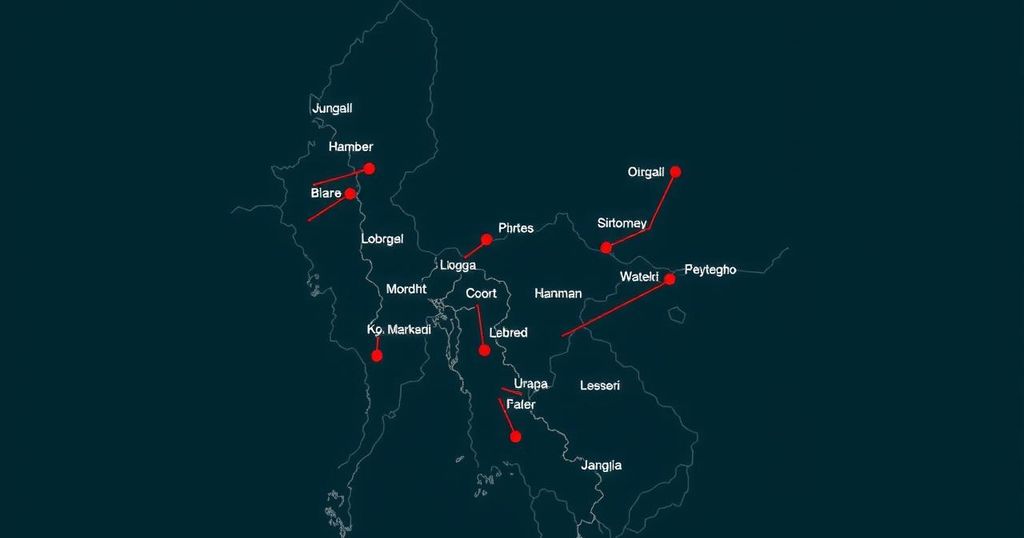Global news
AGNES CALLAMARD, ARKAN ARMY, ASEAN, ASIA, ASS, CHINA, CIVIL WAR, EUROPE, HUMAN RIGHTS, IIMM, LONDON, MEXICO, MIN AUNG HLAING, MYANMAR, NICHOLAS KOUMJIAN, NORTH AMERICA, SYRIA, TERRORISM, UNITED KINGDOM, UNITED NATIONS INDEPENDENT INVESTIGATIVE MECHANISM FOR MYANMAR, VIOLENCE
Fatima Khan
0 Comments
Myanmar’s Crisis: Echoes of Syria Amidst Civil War
Myanmar’s ongoing conflict resembles Syria more than a hopeful democracy, plagued by ethnic violence and military governance. Despite anti-junta efforts, the lack of a unified political agenda has exacerbated persecution, particularly against the Rohingya, with complicity from regional powers like China. The international community, led by ASEAN, has struggled to take decisive action. A collective reconciliation is essential to avoid further division and facilitate recovery.
Four years following the military coup in Myanmar, the nation increasingly mirrors the tragic circumstances of Syria rather than progressing towards democracy. Under the regime of General Min Aung Hlaing, Myanmar faces an intensifying civil conflict, as various ethnic militias gain ground against the Tatmadaw, the military ruling regime supported by China and Russia. The dynamics of this civil war no longer present a simple moral dichotomy; both sides are guilty of atrocities, complicating the narrative of good versus evil. Nicholas Koumjian, the head of the United Nations Independent Investigative Mechanism for Myanmar, noted that acts of war crimes and human rights violations are occurring without accountability. As violence escalates, fissures have formed along both vertical lines (state versus society) and horizontal lines (ethnic communities) in Myanmar. Political rhetoric surrounding democracy and revolution is paradoxically justifying violent actions. In Rakhine State, for instance, vulnerable populations, particularly the Rohingya, face dual threats from both the military regime and anti-junta factions like the Arakan Army, which has shifted towards genocidal acts while claiming to advocate for human rights. Agnès Callamard, Secretary-General of Amnesty International, commented on these dire conditions, stating, “Once again, the Rohingya people are being driven from their homes and dying in scenes tragically reminiscent of the 2017 exodus.” The Rohingyas experience persecution amid the chaos, becoming victims of a wider conflict that fails to distinguish between oppressors and those fighting for freedom. The military’s response to opposition has included mass conscription and heavy-handed tactics, resulting in significant displacement. International dynamics complicate the situation further, especially with China’s recent backing of the junta, facilitating its unchallenged authority within ASEAN. Despite hosting regional conferences, ASEAN remains paralyzed in addressing the conflict effectively due to internal divisions and conflicting priorities among member states. In light of these complexities, it is crucial to reconsider the role of international actors like the United States. Once viewed as a champion for democracy, the U.S.’s waning influence has hindered meaningful change in Myanmar. This has left many disillusioned, especially as the anti-junta movements fail to achieve a comprehensive platform advocating for the rights of all ethnic groups, including the Rohingya. Reflecting on the initial optimism that surrounded the anti-coup movement, it has become evident that a more inclusive and unified approach among various factions is necessary for any hope of recovery. The UN’s Julia Bishop stressed the urgency of breaking away from a zero-sum mentality among Myanmar’s factions, or risk the nation remaining in a perpetual state of division akin to Syria.
The situation in Myanmar has escalated dramatically since the military coup in February 2021, which overthrew the democratically elected government led by Aung San Suu Kyi. This event ignited widespread protests and has spiraled into a significant civil conflict, with various ethnic armed groups mounting resistance against the military junta, known as the Tatmadaw. The dynamics of the conflict reveal a complex interplay of power, ethnicity, and international influence, underscored by the role of significant regional players like China and the implications of global political shifts. The ongoing violence has led to a humanitarian crisis, with thousands displaced and profound social and economic ramifications for Myanmar’s approximately 55 million citizens. Amidst this turmoil, narratives complicate the situation, as factions often accused of atrocities on both sides seek a moral high ground while continuing cycles of violence. The international response, particularly from ASEAN and Western nations, has evolved but remains largely ineffective, raising questions about future actions to restore stability and protect human rights.
The current landscape of conflict in Myanmar presents a convoluted array of challenges, characterized by a devastating civil war that reflects traits of Syria’s past devastation. The involvement of ethnic armed groups and the persistent atrocities committed by both sides have left the nation in dire straits. A unified approach among all parties, including recognition of the needs and rights of all ethnic groups, particularly the Rohingya, is critical for moving towards peace and stability. Without addressing these fundamental issues and the underlying grievances, Myanmar risks sustaining its fractured existence indefinitely.
Original Source: asianews.network




Post Comment